Publishing Talks: David Wilk interviews poet and editor Tom Montag
October 8, 2019 by David
Filed under Publishing History, PublishingTalks
 Publishing Talks began as a series of conversations with book industry professionals and others involved in media and technology, mostly talking about the future of publishing, books, and culture. As every media business continues to experience disruption and change, I’ve been talking with some of the people involved in our industry about how publishing might evolve as it is affected by technology and the larger context of culture and economics.
Publishing Talks began as a series of conversations with book industry professionals and others involved in media and technology, mostly talking about the future of publishing, books, and culture. As every media business continues to experience disruption and change, I’ve been talking with some of the people involved in our industry about how publishing might evolve as it is affected by technology and the larger context of culture and economics.
I’ve expanded this interview series to include conversations that go beyond the future of publishing. I’ve talked with editors and publishers who have been innovators and leaders in independent publishing in the past and the present, and will continue to explore the ebb and flow of writing, books, and publishing in all sorts of forms and formats, as change continues to be the one constant we can count on.
Tom Montag is a poet, critic, editor and publisher whom I have known for many years. I love his biography, which emphasizes his pure identity as a midwesterner. Unlike so many Americans, he has lived in the midwest for his entire life, and his work identifies deeply with where he lives. He does not need to declaim his role as a true poet of place.
Tom was somewhat famously the editor of Margins: A Review of Little Magazines and Small Press Books during the 1970s, was active in the Milwaukee literary scene, and was an editor and feature writer for Wisconsin’s Fox River Patriot during its heyday from 1977 to 1979. With his wife Mary, he edited and published the Wisconsin Poet’s Calendar from 1982 to 1984, which was subsequently handed to the Wisconsin Fellowship of Poets to continue.
Tom spent the better part of his work life at the family owned Ripon Community Printers in Ripon, Wisconsin. During those years, he wrote pithy sayings from a character he called Ben Zen. Four collections of the BZ poems were published between 1992 and 2000.
His memoir, Curlew: Home is about his first fourteen years spent on a farm outside Curlew, Iowa, and about his sense of loss in revisiting the community forty years later. Kissing Poetry’s Sister gathered eleven of Montag’s essays about writing and being a writer, including his long piece on creative nonfiction.
After he retired from his Ripon job, he spent five years creating “Vagabond in the Middle,” an attempt to determine what makes us middle western. He has been collecting stories from residents of twelve communities across the middle west, true stories of their families, their lives, and their connections to the places they inhabit.
Tom and I have worked together on publishing projects at Woodland Pattern in Milwaukee, and we’ve presented together there and at the Lorine Niedecker festival in Fort Atkinson, Wisconsin. Tom’s writing and editing has meant a great deal to me over the years, we are linked in so many ways, yet have such different backgrounds, and it was a great pleasure to speak to him here about his lifetime of work in writing and publishing, though to be sure, we barely scratched the surface of what we could have talked about.
SOMETIMES
Sometimes
in the weeds
a loveliness.
This moment
among all
the moments.
Rain when it’s
needed. Tom,
stop wanting
anything more.
MY FATHER,
holding the Y
of willow
lightly
in his hands,
walks the land.
The willow
leaps
for something
we do not
see: Here,
my father says
to the man,
drill here.
Tom is the author of many books and has edited anthologies as well. His most recent large scale collection is In This Place: Selected Poems 1982-2013.
There are two really good written interviews with Tom in the Wombwell Rainbow and the Mocking Heart Review. You can learn more about Tom and his work here and you can keep up with his prodigious output of poetry at his outstanding blog The Middle Westerner where you will regularly find him posting poems that will endure.
“Exploring the heart of the country; or, as Nancy Besonen has said, “Tom Montag is defining the character of the Midwest – one character at a time.”
Thanks Tom, for being who you are.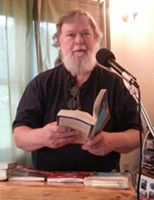
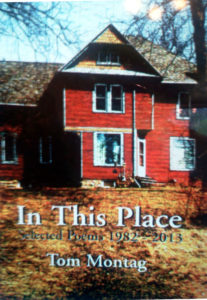
Podcast: Play in new window | Download
David Wilk talks with John O’Brien of Dalkey Archive Press
January 26, 2016 by David
Filed under Publishing History, PublishingTalks
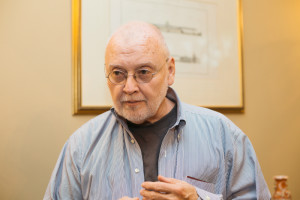 Publishing Talks began as a series of conversations with book industry professionals and others involved in media and technology about the future of publishing, books, and culture. As we continue to experience disruption and change in all media businesses, I’ve been talking with some of the people involved in our industry about how publishing might evolve as our culture is affected by technology and the larger context of civilization and economics.
Publishing Talks began as a series of conversations with book industry professionals and others involved in media and technology about the future of publishing, books, and culture. As we continue to experience disruption and change in all media businesses, I’ve been talking with some of the people involved in our industry about how publishing might evolve as our culture is affected by technology and the larger context of civilization and economics.
I’ve now expanded the series to include conversations that go beyond the future of publishing. I’ve talked with editors and publishers who have been innovators and leaders in independent publishing in the past and into the present, and will continue to explore the ebb and flow of writing, books, and publishing in all sorts of forms and formats, as change continues to be the one constant we can count on.
It’s my hope that these conversations can help us understand the outlines of what is happening in publishing and writing, and how we might ourselves interact with and influence the future of publishing as it unfolds.
The latest in this series of interviews with publishers and editors is my talk with another old friend, John O’Brien, founder of Dalkey Archive Press and the Review of Contemporary Fiction. The journal began in 1981 and the press was launched in 1984. It’s a remarkable and singular enterprise, committed to publishing internationally as almost no other American publisher. Today the press and journal are based in Victoria, Texas through the auspices of the University of Houston at Victoria, and in Dublin, Ireland, with offices at the Trinity University.
If you are interested in the history of the press as explained by John himself, there is an excellent descriptive piece about Dalkey on its own website here. John places the Review (RCF) and the press (Dalkey) as coming literally from his own interest in writers of substance who were and still are not often included in the mainstream of literary culture. In that way, John and his publishing have always been self identified as outsiders, but of course through his own critical and publishing efforts, and other circumstances, no small number of the writers that have either been covered in RCF or published by Dalkey (or both) have reached a meaningful level of recognition and significance over these many years of the his work.
It is no small thing to have been at this work for so long, and so well. The internationalist tendency here is a strong one, from Luisa Valenzuela to Wallace Markham, to Flann O’Brien and many others, John has helped introduce an incredible range of writers from all over the world to North American readers, and vastly expanded the literary landscape for many of us. His commitment to a range of American writers like Paul Metcalf, Gilbert Sorrentino, Doug Woolf and many others, has been nothing short of heroic.
Writing on the Press’ own website, this is what John says about his goals for Dalkey and RCF: “I wanted the Press to define the contemporary period, or at least what I saw as what was most important in the contemporary period. Further, I wanted these books permanently protected, which is why from the start the Press has kept all of its fiction in print, regardless of sales. And as with the Review, I wanted the books to represent what was happening around the world rather than more or less being confined to the United States. Like the Review, Dalkey Archive Press was and is a hopelessly quixotic venture.”
In 2011, Dalkey Archive received a Lifetime Achievement Award from the National Book Critics Circle, and in 2015 John O’Brien was made a knight in the Orde des Arts et des Lettres for his contributions to publishing French literature abroad. Not bad for such a “hopelessly quixotic” operation.
John and I have many interests in common and count each others as friends and fellow travelers in literature and writing. Having this conversation about RCF and Dalkey, programs I believe have incalculable value to our literary culture, was a true pleasure for me, and one that I will always treasure.
Length alert: this is a longer conversation than most (68 minutes), but I hope will be well worth the time spent in listening. Thanks!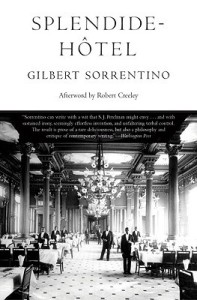
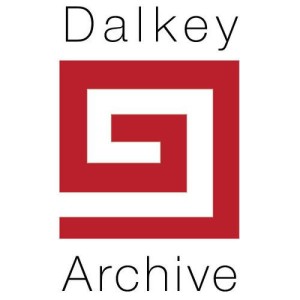
Podcast: Play in new window | Download
